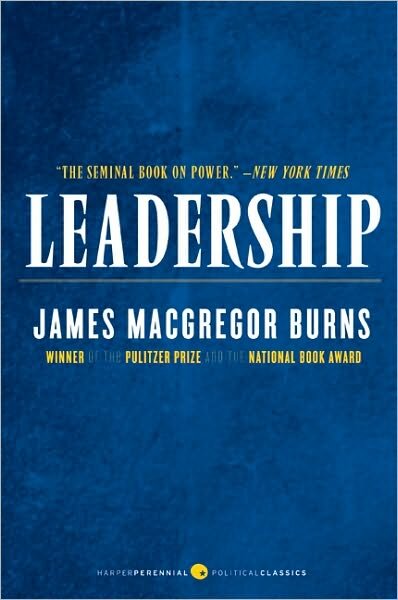James McGregor Burns, Leadership (Harper Perennial Political Classics). Harper Publishers, 2010.
Referenced in: Transformational Leadership
LifeandLeadership.com Summary
This is Burns’ classic work on political history first published in 1978 that introduced the concept of Transformational Leadership. Most authors in leadership studies since this volume reference it as the foundation of modern leadership studies.
Burns distinguishes between transformational and transactional leadership.
The relations of most leaders and followers are transactional – leaders approach followers with an eye to exchanging one thing for another: jobs for votes, or subsidies for campaign contributions. Such transactions comprise the bulk of the relationship among leaders and followers, especially in groups, legislatures, and parties. Transforming leadership, while more complex, is more potent. The transforming leader recognizes and exploits and existing need or demand of a potential follower. But, beyond that, the transforming leader looks for potential motives in followers, seeks to satisfy higher needs, and engages the full person of the follower. The result of transforming leadership is a relationship of mutual stimulation and elevation that converts followers into leaders and may convert leaders into moral agents. (4)
He elaborates:
Transactional leadership occurs when one person takes the initiative in making contact with other for the purpose of an exchange of valued things. The exchange could be economic or political or psychological in nature: a swap of goods or of one good for money; a trading of votes between candidate and citizen or between legislators; hospitality to another person in exchange for willingness to listen to one’s troubles. Each party to the bargain is conscious of the power resources and attitudes of the other. Each person recognizes the other as a person. Their purposes are related, at least to the extent that the purposes stand within the bargaining process and can be advanced by maintaining that process. But beyond this the relationship does not go. The bargainers have no enduring purpose that holds them together; hence they may go separate ways. A leadership act took place, but it was not one that binds leader and follower together in a mutual and continuing pursuit of a higher purpose.
Transforming leadership occurs when one or more persons engage with others in such a way that leaders and followers raise one another to higher levels of motivation and morality. Their purposes, which might have started out as separate but related, as in the case of transactional leadership, become fused. Power bases are linked not as counterweights but as mutual support for a common purpose. …Transforming leadership ultimately becomes moral in that it raises the level of human conduct and ethical aspiration of both leader and led, and thus it has a transforming effect on both. Perhaps the best modern example is Gandhi, who aroused and elevated the hopes and demands of millions of Indians and whose life and personality were enhanced in the process. Transcending leadership is dynamic leadership in the sense that the leaders throw themselves into a relationship with followers who will feel “elevated” by it and often become more active themselves, thereby creating new cadres of leaders. (19-20)
He develops each type of leadership in considerable detail, giving examples of leaders in politics, religion, and society in general. The book is not practical, but theoretical. As a theory, however, none have been more influential in the latter half of the twentieth century up to the present.
Transactional leadership in a church environment could be pastoral care in exchange for favor, good will, and a secure ministry position. It could be religious goods and services in exchange for increases in the numbers of financially contributing members. It could be a good sermon in exchange for praise and accolades. It could be elders making decisions to keep people happy in exchange for peaceful, non-disruptive participation from congregants. While most would not affirm these exchanges as adequate embodiments of the high calling of ministry, it is the currency that fuels many ministries.
Transformational leadership, on the other hand, transcends these mundane exchanges into higher levels of motivation and morality that actually have the potential to effect lasting change in both followers and leaders. It also risks rejection or other forms of conflict if necessary to serve the higher interests.
Later writers such as Bernard Bass built on Burns, and were not as hard on the transactional side. But Burns began the discussion, and many of his expressions have endured to the present as foundational to understanding effective leadership.
From the Publisher
Pulitzer Prize-winning historian James MacGregor Burns has devoted his legendary career to the study of leadership in all its aspects—from politics to business. Leadership, Burns’s pioneering study, introduces the highly influential theory of “transformational leadership,” stating that the best leaders are those who inspire others to come together toward the achievement of higher aims. Featuring fascinating case studies drawn from history, Leadership is the classic text for anyone seeking to understand executive decision-making, the dynamics of influence, and moral leadership.
About the Author
James MacGregor Burns is a presidential biographer, authority on Leadership Studies, Woodrow Wilson Professor (emeritus) of Political Science at Williams College, and scholar at the James MacGregor Burns Academy of Leadership at the University of Maryland, College Park. He received a Pulitzer Prize and National Book Award in 1971 for his Roosevelt: Soldier of Freedom 1940-1945.
***For additional information on this resource, including reviews, click the bookstore links. Check the reference at page top or the links below for resource guides on related topics.***
Related Areas
See Other Resources on Leadership:
See Related Ministry Resources:
- Change and Transition
- Church Administration
- Church Leadership Foundations
- Church Leadership Strategies
- Conflict
- Elders, Plural-Elder Congregational Leadership
- Minister Self-Care
- Pastoral Care
See Resources on Over 100 Areas of Ministry Leadership:


